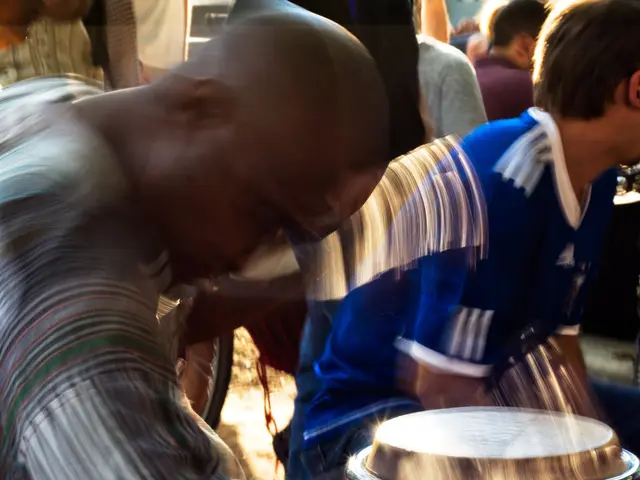Strategies for Avoiding Accidental Slips and Trips
Falling: A Common Struggle for Parkinson's Patients
Falls can be a frequent issue for people battling Parkinson's, and since everyone's journey is unique, they can rear their heads at any stage of progression. Ranging from minor scrapes to life-threatening hospital visits, falls can pose serious risks.
Several factors cause falls in Parkinson's patients:
- Dropping Blood Pressure - also known as postural hypotension, can cause dizziness due to rapid position changes, medication side effects, or discontinuation of anti-hypertensives. It may even serve as a precursor to a Parkinson’s diagnosis.
- Freezing of Gait - a debilitating motor symptom characterized by an inability to walk despite the intention to do so.
- Short, Shuffling Steps - Often the result of other motor symptoms like muscle rigidity, stiffness, and slow movement, making normal step-taking challenging.
- Postural Changes - such as leaning forward, caused by muscle rigidity, brain changes controlling posture, or dystonia (muscle twisting, spasms, or cramps that occur at different times of day).
- Environmental Hazards - Rugs, furniture, or clutter around the home can increase the risk of falls as individuals navigate their living spaces.
Each of these factors can impair balance, leading to falls. While falls are more likely in later stages of Parkinson's, they can happen at any point in the disease progression. If you've recently fallen or are experiencing frequent falls, consult your General Practitioner (GP) and neurologist immediately.
Adjustments to medication regimens may help in some cases, and you'll likely be referred to a physiotherapist and occupational therapist for further assessment, treatment, and advice on fall prevention strategies.
Lowering Your Fall Risk
Here are some tips to help you avoid falls:
- If you suspect postural hypotension, discuss this with your GP. They will monitor your blood pressure while seated and standing. Additionally, you can measure blood pressure at home after waiting 2 minutes from standing, and consult your neurologist. At-home remedies include sitting on the edge of your bed for a while before standing and increasing salt intake and fluid consumption.
- Always take medications on time.
- Regular exercise can improve balance and leg strength, reducing the risk of falls. Try incorporating Tai Chi, strength training, or other exercise programs recommended by your healthcare provider.
- Focus on long steps when walking and keep at least one hand free. Using a backpack instead of carrying objects can help maintain balance.
- Practicing walking to a beat or rhythm can aid in balance improvement.
- When turning, adopt the 'U' technique—face forward and make a wide turn rather than pivoting suddenly.
- If you become 'frozen,' visualize stepping over an imaginary object.
- Eliminate hazards in your home by removing rugs, mats, or furniture that block walkways.
If you have questions about fall prevention, contact the Parkinson's NSW InfoLine on 1800 644 189 and speak with a registered nurse.
A holistic approach that encompasses exercise programs, assistive devices, home modifications, and balance techniques can significantly reduce the risk of falls for individuals with Parkinson's disease, promoting their independence and wellbeing.
- Music therapy can be beneficial for Parkinson's patients as it helps to improve motor symptoms like freezing of gait and rhythmic changes, which are common contributors to falls.
- A healthy environment free of clutter and hazards plays a crucial role in workplace-wellness, especially for individuals with chronic diseases like Parkinson's, as it reduces the risk of falls.
- In addition to physical health, maintaining eye health is essential for keeping balance and preventing falls, as vision problems can lead to missteps and increased fall risk.
- Aging can lead to several medical conditions and chronic diseases, such as cancer, respiratory conditions, and neurological disorders, which often manifest in impaired balance and increased fall risk.
- Skin care and proper nutrition are vital components of health and wellness, as they contribute to overall fitness and exercise capabilities, reducing the risk of falls, especially in elderly individuals with Parkinson's.
- Workplace wellness programs that prioritize mental health can help Parkinson's patients cope with the challenges of living with the disease, thereby reducing stress levels and the risk of falls.
- Therapies and treatments like CBD oil, known for its anti-inflammatory properties, can help manage symptoms like muscle rigidity and dystonia, hence lowering the risk of falls in Parkinson's patients.
- Cardiovascular health plays a significant role in preventing falls, as strong heart and blood vessels help maintain proper blood pressure and support balance during movement.
- Proper care and management of skin conditions and mental health issues can help Parkinson's patients avoid falls as a result of impaired senses, poor overall health, or medication side effects.








